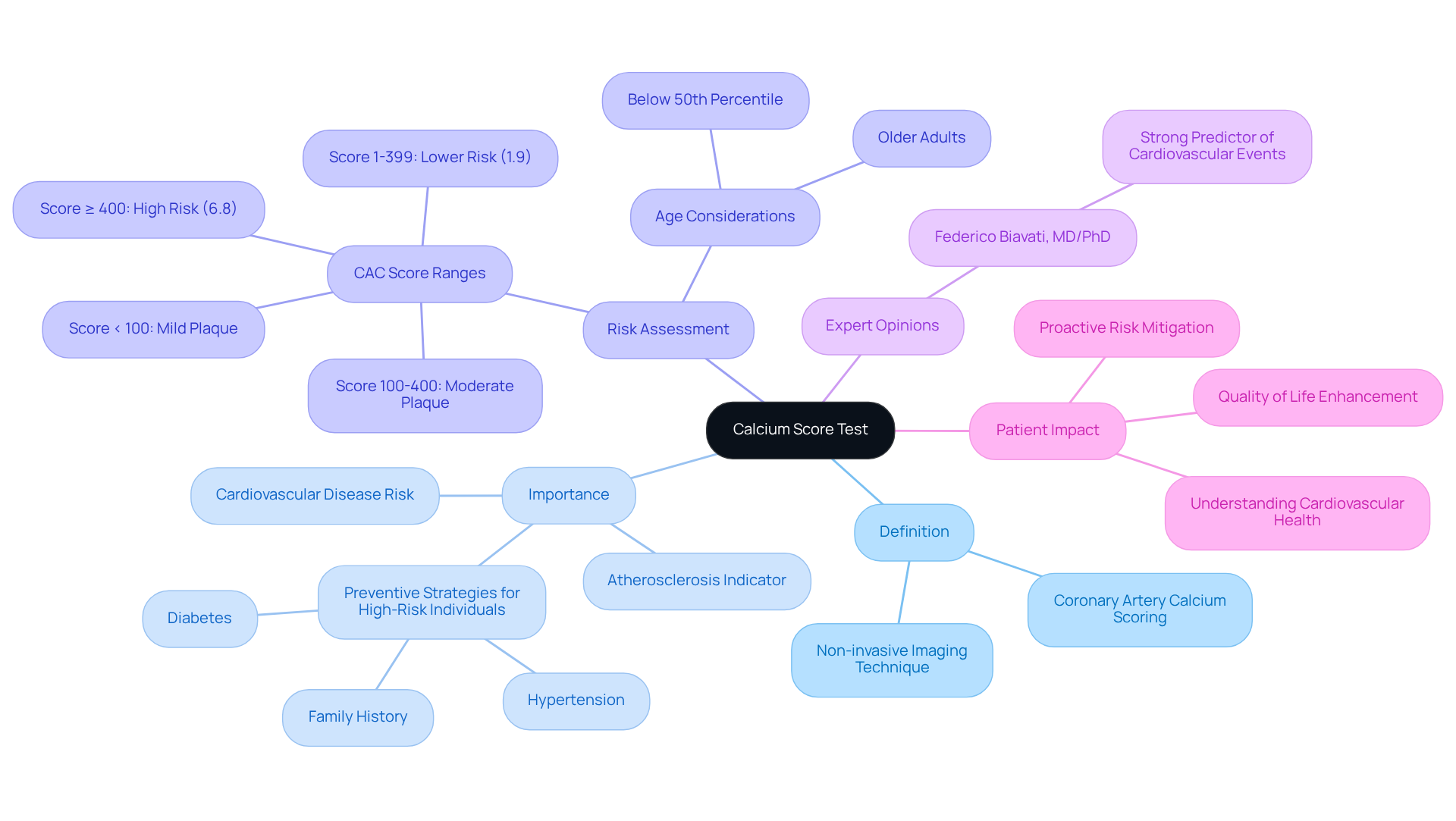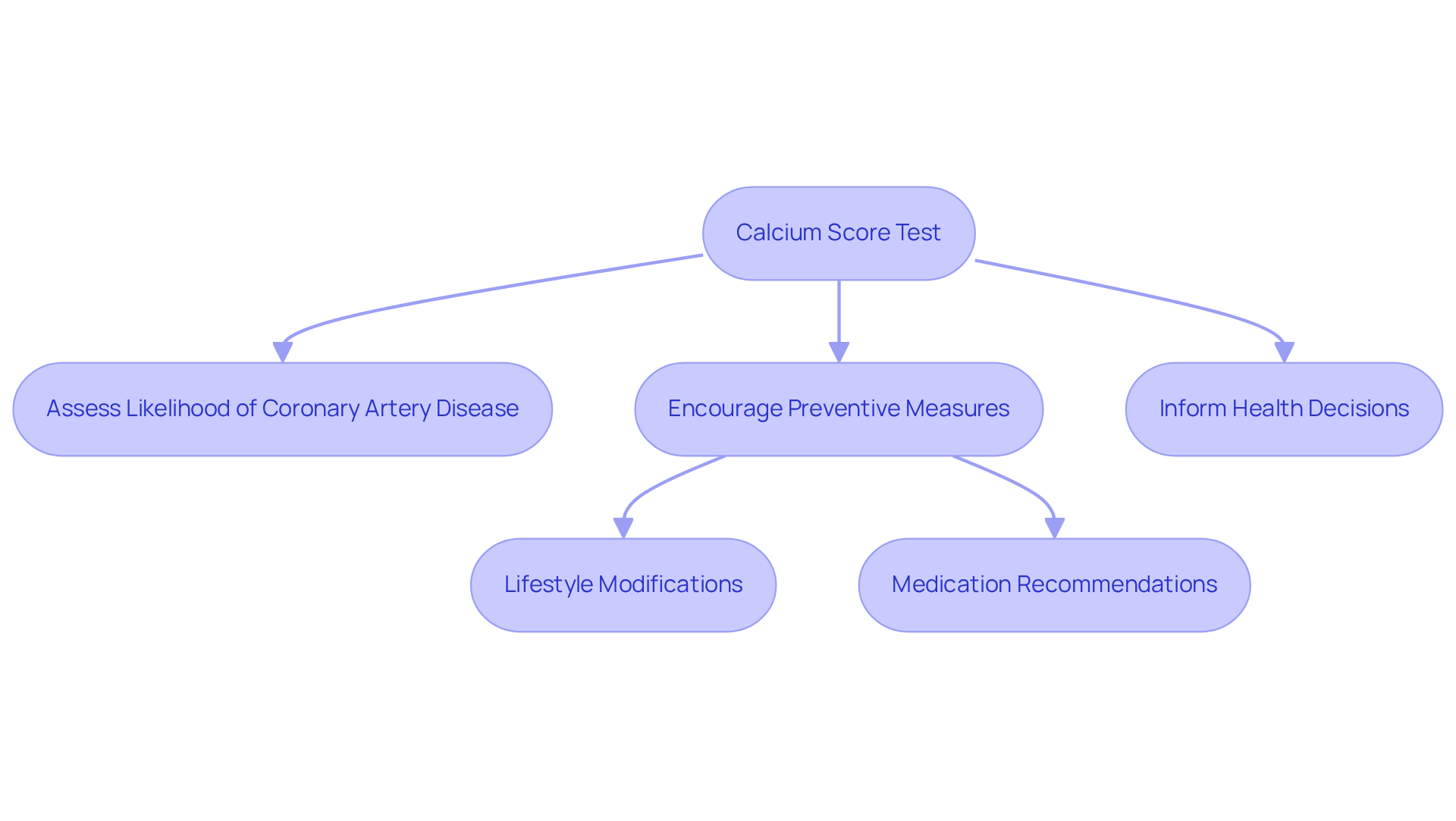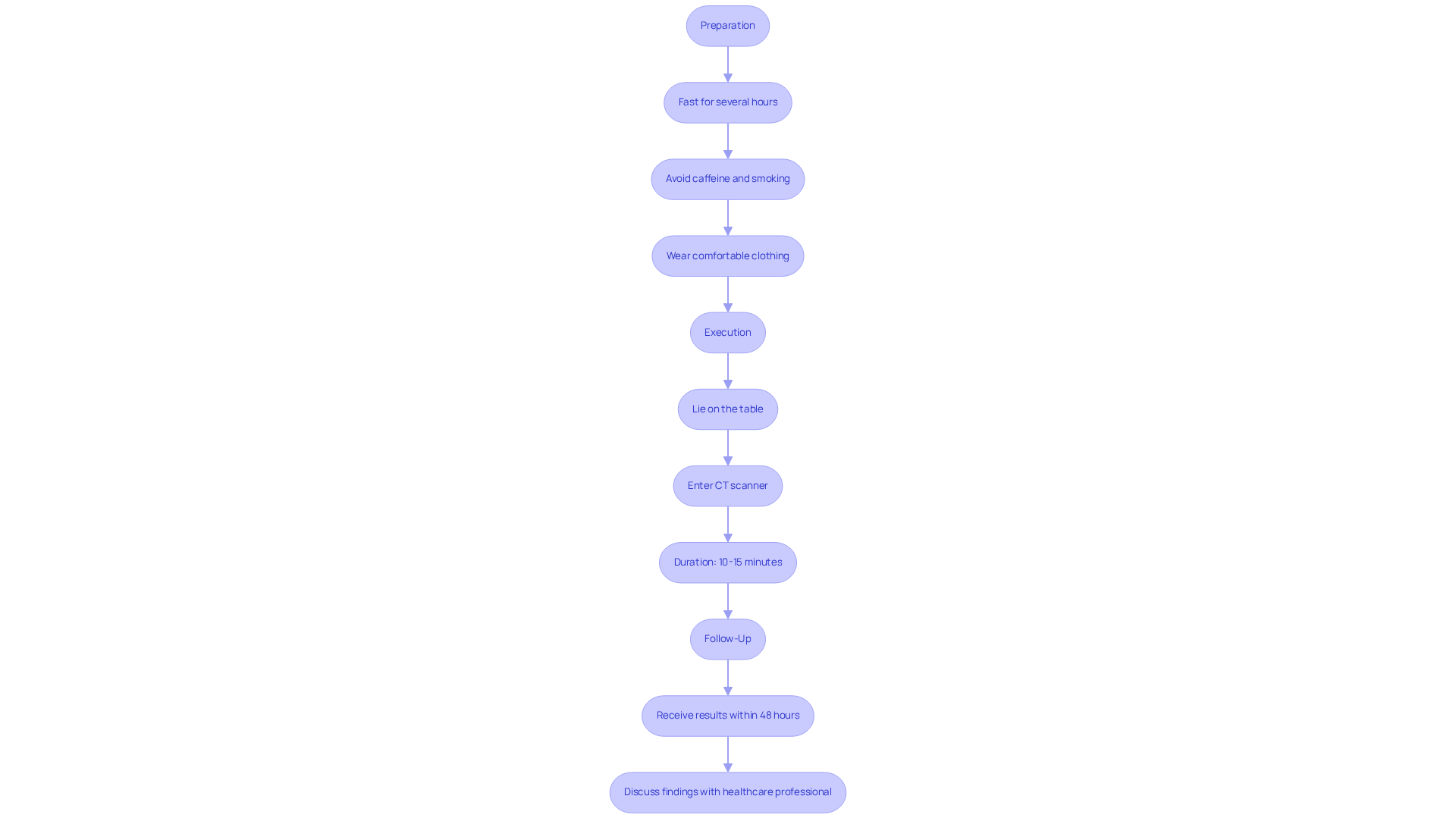


The calcium score test serves as an essential tool for understanding your heart health, particularly in assessing the likelihood of coronary artery disease (CAD). By measuring calcium deposits in the coronary arteries, this test provides valuable insights, with higher scores indicating a greater risk for cardiovascular issues. It's natural to feel concerned about these results, especially for older adults or those with existing risk factors. However, gaining this knowledge empowers you to take proactive steps towards better health.
Understanding your calcium score can be a turning point in your health journey. It opens the door to making informed lifestyle changes that can significantly improve your heart health outcomes. Remember, you are not alone in this process; many individuals face similar concerns. Embracing these findings can lead to positive changes, encouraging you to engage in healthier habits and seek support when needed.
Ultimately, the goal is to foster a sense of control over your health. By taking action based on your calcium score, you can work towards enhancing your well-being and reducing your risk factors. It's important to approach this journey with compassion for yourself, knowing that every step you take contributes to a healthier future.
Understanding heart health can often feel overwhelming, especially with the many tests and assessments available. The calcium score test, a non-invasive imaging technique, offers critical insights into the presence of calcium deposits in the coronary arteries. This serves as a key indicator of potential cardiovascular disease. By exploring the results of this test, individuals can uncover vital information about their heart health and take proactive steps toward prevention.
But what do these scores truly mean? How can they influence one’s approach to cardiovascular wellness? It's natural to have questions and concerns, and seeking answers can be a vital step toward taking charge of your health.
The calcium score test, often referred to as coronary artery calcium scoring, is a non-invasive imaging technique that employs computed tomography (CT) to identify calcium deposits in the coronary arteries. These deposits are indicative of atherosclerosis, a condition where plaque builds up in the arteries, potentially leading to cardiovascular disease. Understanding the significance of this assessment is crucial, as it provides a measurable indication of coronary artery disease (CAD) likelihood. This enables healthcare professionals at Amavita to tailor preventive strategies effectively for high-risk individuals, including those with diabetes, hypertension, or a family history of cardiovascular issues. An elevated calcium score is associated with a higher risk of cardiac incidents and other cardiovascular events, making it an essential tool in preventive cardiology, especially for older adults who may have unique contributing factors.
Recent research from 2025 has underscored the value of scoring in assessing heart disease risk among older populations. For instance, studies reveal that patients with a coronary artery CAC value of 400 or more face a significantly increased risk of 6.8% for major adverse cardiovascular events, compared to just 1.9% for those with values between 1 and 399. Additionally, a score between 100 and 400 indicates moderate plaque, further enhancing risk evaluation. This stark contrast emphasizes the test's role in early detection and intervention, aligning with Amavita's dedication to advanced cardiovascular care and its diagnostic capabilities.
Expert opinions reinforce the importance of calcium scoring. As noted by Federico Biavati, MD/PhD candidate, "Coronary artery deposits are a strong and independent predictor of cardiovascular events," highlighting its critical role in vascular health assessments for older adults. Practical examples illustrate its impact; patients who undergo scoring at Amavita gain a clearer understanding of their cardiovascular health and can take proactive steps to mitigate risks, ultimately enhancing their quality of life. By integrating this test into regular evaluations, healthcare providers can significantly improve disease prevention strategies for older adults. Furthermore, a calcium level metric below the 50th percentile for age suggests slower plaque formation compared to the general population, offering deeper insights into personal heart health assessments.

Understanding your health is a vital step towards a brighter future. The calcium score test results play an essential role in assessing your likelihood of coronary artery disease by quantifying the amount of calcified plaque in your arteries. This non-invasive and swift procedure offers crucial insights that can encourage healthcare providers to recommend proactive preventive measures, such as lifestyle modifications and medication.
For older individuals, who often face various cardiovascular risk factors, grasping their mineral levels is crucial for informed conversations about treatment choices and necessary lifestyle changes. Specifically, the CardioElite™ program utilizes advanced diagnostic tools to evaluate mineral levels, enabling tailored interventions for patients.
Studies suggest that individuals who receive their calcium score test results often make significant lifestyle adjustments, such as adopting healthier eating habits and increasing physical activity. These changes can greatly enhance quality of life and diminish the risk of major cardiovascular events. By understanding their mineral assessments, patients can take charge of their cardiovascular health, leading to improved outcomes and a more proactive approach to managing vascular risks. This is particularly important in skilled nursing facilities, where advanced diagnostic tools and coordinated care are essential for reducing hospital readmissions.
Remember, you are not alone on this journey; support is available to help you navigate your health with confidence.

Preparing for a calcium assessment test can feel a bit daunting, but understanding the process can help ease your concerns. It's important to fast for several hours before the test and to avoid caffeine and smoking—these steps are crucial for accurate results. Wearing comfortable clothing is recommended, and you may be asked to change into a gown for the procedure.
During the test, you will lie on a table that gently slides into the CT scanner. This machine captures detailed images of your heart and coronary arteries. The entire process typically lasts about 10 to 15 minutes and is painless, allowing you to relax. After the test, you can usually expect to receive your results within 48 hours.
Once your results are available, you will have a conversation with a healthcare professional who will explain the findings in relation to your overall health. This discussion is vital, as it can guide any necessary lifestyle changes or treatments that may benefit you. If the mineral measurement indicates a significant concern, further follow-up procedures might involve additional imaging tests or consultations about possible interventions. This is especially important for older patients who may have other underlying health issues.
Remember, you are not alone in this process. Your healthcare team is here to support you every step of the way, ensuring you feel informed and cared for. If you have any questions or concerns, don't hesitate to reach out for assistance—your health and comfort are our top priorities.

Understanding calcium score test results is essential for your cardiovascular health. The evaluations, which include calcium score test results, are classified to represent different degrees of cardiovascular risk. A value of 0 signifies no mineral presence and a low chance of cardiac illness. Values between 1-10 imply minimal mineral and a low risk. Values from 11-100 denote mild plaque accumulation, corresponding with a moderate risk. Values ranging from 101-400 exhibit moderate plaque and an elevated risk, while values exceeding 400 indicate extensive plaque accumulation, representing a significant risk of cardiac illness.
For patients, especially those at high risk—like individuals with diabetes, hypertension, or a family history of heart disease—comprehending these results is vital. They inform discussions with healthcare providers about necessary lifestyle changes, potential medications, and further testing. Older patients, in particular, may need to take more prompt actions based on higher mineral assessments to proactively manage their cardiovascular health.
Research shows that individuals with a zero coronary artery measurement have an exceptionally low risk of coronary events, with only 0.25% of older patients experiencing such occurrences. This underscores the importance of routine evaluations and personalized treatment plans based on calcium score test results. Individuals aged 65 and above may particularly benefit from tailored approaches to enhance their cardiovascular wellness.
At Amavita, our advanced imaging capabilities and comprehensive evaluations, including the CardioElite™ program, ensure that you receive the best management and monitoring for your heart health. The CardioElite™ program specifically addresses the needs of high-risk patients by providing real-time diagnostic data and 24/7 cardiology consultation, enhancing proactive patient management.
As noted by distinguished research physician Jeffrey L. Anderson, 'the coronary artery calcium score appears to be an excellent and accurate indicator of health and overall prognosis.' We are here to support you every step of the way, ensuring that you feel valued and cared for in your journey towards better heart health.

Understanding the calcium score test is essential for effectively managing your heart health. This non-invasive procedure offers valuable insights into the presence of calcium deposits in the coronary arteries, acting as a crucial indicator of potential cardiovascular disease. By grasping the implications of your calcium score, you can engage in informed discussions with your healthcare provider about your cardiovascular health and make proactive choices to mitigate risks.
This article highlights the importance of the calcium score test, especially for older adults and those with pre-existing risk factors. From preparation to execution and interpreting results, each step is designed to empower you. The findings can lead to significant lifestyle changes, tailored interventions, and an enhanced quality of life, ultimately reducing the likelihood of major cardiovascular events. The stark differences in risk associated with varying calcium scores emphasize the necessity of regular evaluations and personalized care.
Ultimately, the calcium score test represents a pivotal tool in preventive cardiology. It not only aids in early detection and intervention but also fosters a proactive approach to managing your heart health. Embracing this knowledge can lead to better outcomes, encouraging you to take charge of your cardiovascular wellness and collaborate closely with healthcare professionals to create a healthier future. Remember, you are not alone in this journey; support is available every step of the way.
What is the calcium score test?
The calcium score test, also known as coronary artery calcium scoring, is a non-invasive imaging technique using computed tomography (CT) to identify calcium deposits in the coronary arteries, which indicate atherosclerosis and the potential for cardiovascular disease.
Why is the calcium score test important?
The test is important because it provides a measurable indication of the likelihood of coronary artery disease (CAD), enabling healthcare professionals to tailor preventive strategies for high-risk individuals, such as those with diabetes, hypertension, or a family history of cardiovascular issues.
How does an elevated calcium score affect cardiovascular risk?
An elevated calcium score is associated with a higher risk of cardiac incidents and other cardiovascular events, making it a vital tool in preventive cardiology, particularly for older adults.
What recent research findings support the use of the calcium score test?
Recent research from 2025 indicates that patients with a coronary artery CAC value of 400 or more have a 6.8% risk of major adverse cardiovascular events, compared to 1.9% for those with scores between 1 and 399. A score between 100 and 400 indicates moderate plaque, enhancing risk evaluation.
What expert opinions highlight the significance of calcium scoring?
Experts, such as Federico Biavati, MD/PhD candidate, emphasize that coronary artery deposits are strong and independent predictors of cardiovascular events, underscoring the test's critical role in assessing vascular health, especially in older adults.
How does the calcium score test impact patient understanding of cardiovascular health?
Patients who undergo calcium scoring gain a clearer understanding of their cardiovascular health, allowing them to take proactive steps to mitigate risks and ultimately enhance their quality of life.
What does a calcium score below the 50th percentile indicate?
A calcium score below the 50th percentile for age suggests slower plaque formation compared to the general population, providing deeper insights into an individual's heart health.